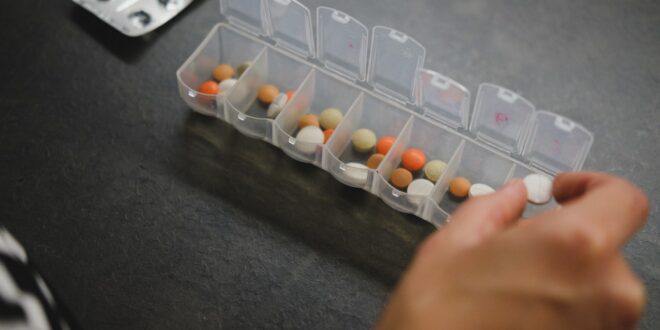If you’re managing your own medications at home (and possibly your partner’s as well), there’s room for error if you’re not careful. Error can lead to missed or doubled doses, unsafe interactions, and dangerous side effects. The more prescription medications you are dealing with, the greater the risk of error. That’s why the following med-management tips can help keep you safe when you’re at home, or away.
Be a tidy Kiwi
Keep all your medications in one place (unless some need to be kept at a specific temperature). Make the ‘one place’ out of reach of children, or adults who experience confusion. Keeping your medication in one place is a visual reminder of when you need to phone, or return to, your GP for a repeat prescription.
Highlight it
Use a highlighter on medicine packets or bottles to draw your attention to the repeat dates. Note these dates on your digital or physical calendar, and order the medication in plenty of time.
List it
Note down the name of each medication you take, what it’s for, how much you take, and when you take it. Put this list in a place others can easily find (such as on the door of your fridge or on your noticeboard). This list will help family and paramedics help you, in an emergency.
Get organised
Buy a pill organiser, and make a weekly date with yourself to fill it (do the job when you’re alone, and won’t be interrupted). It’s not a weakness to ask a family member or friend to double check your work – it’s a sensible safety precaution
Blister packs
If you find a pill organiser too onerous, ask your GP about pharmacy blister packs of tablets. These are packed for you at the pharmacy, and you may be entitled to a subsidy to help you pay for the service.
Out with the old
Don’t hang on to out-of-date medication! It only leads to confusion. It can also act as a temptation to self-medicate instead of heading to your GP for advice. Out-of-date medication should be returned to your pharmacy, in its original containers (if you have them) for safe disposal.
App-proriate
A number of phone apps are available to help you remember to take medications. But they are only as good as the person who enters the relevant data. Check out an app here, but be sure to include your GP, family, or a reliable close friend in your decision.
Digital alarm
If you don’t already know how to, learn how to use the digital alarm on your phone. It can be set for multiple, repeat, daily reminders to help you keep track of when to take medications.
Build it in
As a reminder to take meds, build taking them into your daily routine. For example, take them at meal times, or when you complete other regular activities (such as cleaning your teeth, making your bed, fetching the paper, or before you head out on your morning walk).
Don’t get caught out
When checking prescription supplies, remember to factor in public holidays such as Easter, Christmas, and long weekends. Order ahead if you need to.
On holiday
The last place you want to be without medication, is on holiday, especially in another country. As a precaution, follow this advice:
• Visit your GP for extra prescription medication if you are going to be away from home for an extended period.
• Seek permission from your airline, before you fly, to carry needles and syringes in your carry-on luggage.
• Carry at least two week’s supply of medications in your carry-on luggage (in case you are separated from your checked-in luggage).
• Check before entering a foreign country, that it is legal for you to be carrying the medications or medical equipment (such as a syringe) you require.
• Carry a signed, officially stamped letter from your GP, listing the medications and equipment you are carrying with you (consider having this translated if you are entering a ‘difficult’ country).
• Always pack your medications and equipment in their original containers.
• When travelling through different time zones, pre-plan the times you need to take your medications.
Taking medication is a serious business. Care for yourself, and those you love, by managing it in ways that limit the chance of error.









Join the Discussion
Type out your comment here:
You must be logged in to post a comment.